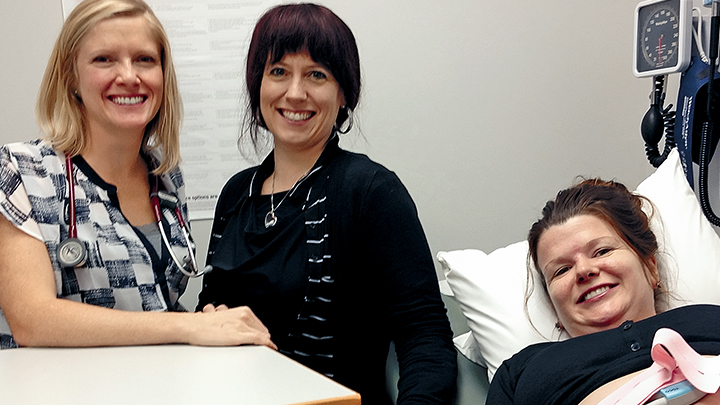
April 27, 2016

Maternity care physician Dr. Melissa Torriero, left, joins women’s health co-ordinator Tracey Russell to perform a fetal non-stress test on 31-year-old Andrea Aikins, using a new fetal heart monitor at the Highland Primary Care Network in Airdrie.
Story by Kerri Robins; Photo courtesy Tracey Russell
AIRDRIE — When Andrea Aikins arrived 36-weeks pregnant at the Women’s Health Clinic here last January, a routine prenatal test revealed her unborn baby had a higher than normal heart rate.
But thanks to a new fetal heart monitor at the clinic, part of the Highland Primary Care Network (HPCN), Aikins was given a non-stress test to further monitor her baby’s heart rate.
“It was nice having the test here rather than having to travel to Calgary,” says the 31-year-old Airdrie resident.
A non-stress test uses a fetal heart monitor to see if the baby’s heart rate goes faster while resting or moving. In Aikin’s case, it showed her baby was doing just fine.
“It really eased my mind to find out everything was all right,” Aikins says.
The fetal heart monitor, which arrived at the clinic last November, cost just over $19,000 and was funded by the Airdrie Health Foundation.
The monitor — a sensor belt used on expectant moms during pregnancy, labour and delivery — is placed around mom’s belly. It uses ultrasound to read the baby’s heart rate as a second sensor gauges the strength and duration of contractions during labour.
The average fetal heart beats between 120 and 160 times a minute, a rate that can vary according to conditions in the uterus. An abnormal fetal heart rate can mean that the fetus is not getting enough oxygen, or that there may be other problems.
Women’s health co-ordinator Tracey Russell cheers the newest addition to the clinic’s “family”.
“We opened our clinic in November 2014, so receiving the monitor a year later was like our first birthday present,” says Russell.
“It really gives peace of mind for our moms, because whenever there’s question on how baby is doing, we can monitor and let mom know everything is OK,” says Russell.
“And it gives us peace of mind because we can take action right away if a problem becomes apparent.”
Micheline Nimmock, Executive Director of the HPCN, says she’s also grateful for the foundation funding.
“The fetal heart monitor is a vital piece of equipment for the network’s maternity clinic,” she says.
Primary Care Networks (PCNs), such as the HPCN, partner with Alberta Health Services to bring local physicians and other health care professionals together to provide comprehensive patient care to Albertans.
Michelle Bates, Chair of the Airdrie Health Foundation, says she’s happy to work with both organizations and provide equipment for women’s health in Airdrie.
“The clinic is a vital part of our community, and they provide great care in maternal health,” says Bates.
“I’m so grateful to our community for contributing so much to our local health care.”
For more information, please visit airdriehealthfoundation.ca